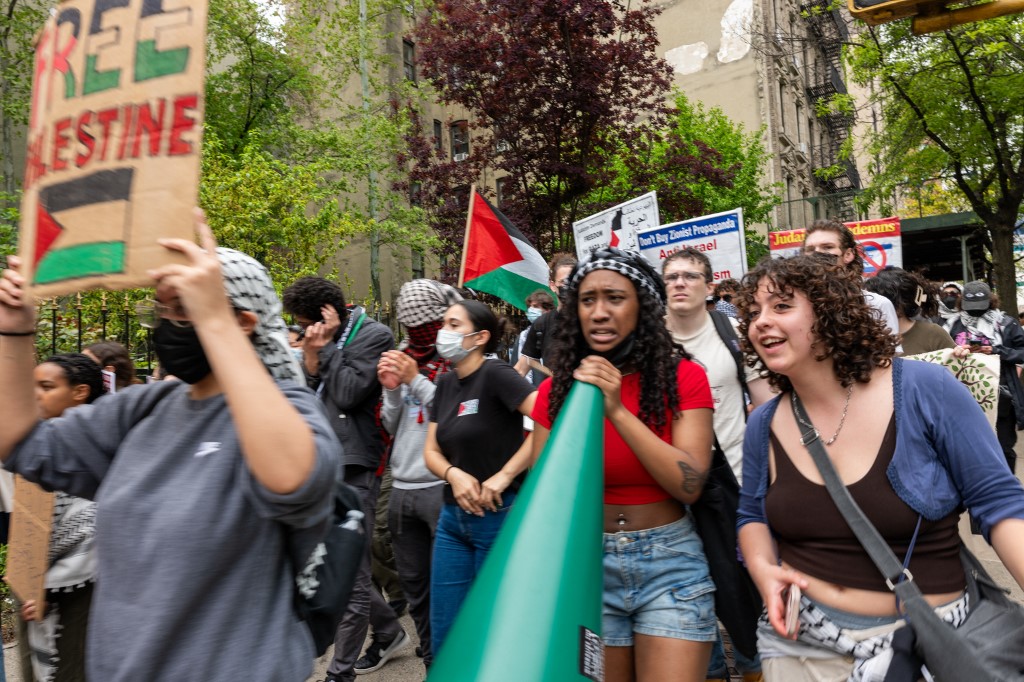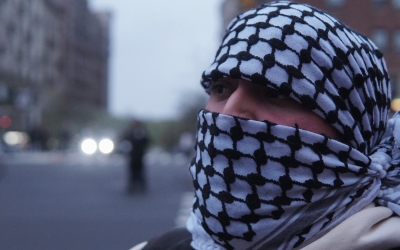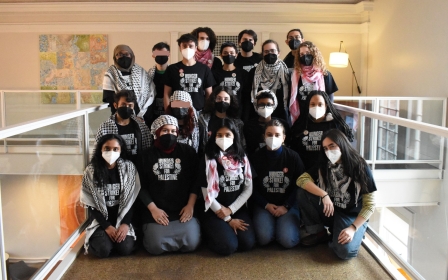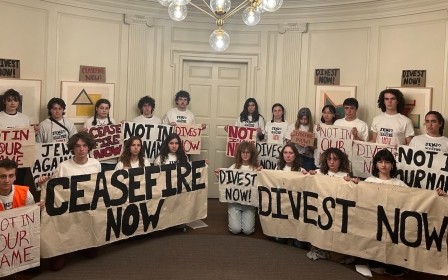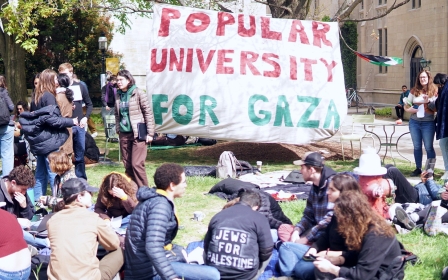'A battle scene': The brutality of police raids at Columbia University and CCNY

Testimony from several witnesses reveals that the New York Police Department assaulted a number of students and then blocked those injured students from accessing medical assistance at two New York university campuses where hundreds were holding Gaza solidarity encampments.
Evidence of police excesses has begun to emerge after university administrators ordered a sweep on the evening of 30 April local time at two New York City campuses, Columbia University and City College of New York (CCNY), in what has now become a nationwide story of police repression of student protests for Palestine.
Street medics - local parlance for certified first aid volunteers who assist during crises in the city - told Middle East Eye that they watched in horror as a notoriously violent counter-terror battalion of the NYPD, padded in riot gear and known as the Special Response Group (SRG), entered the campuses and beat protesters.
At CCNY in West Harlem, students were sprayed with mace and pepper spray. Others were beaten with batons and were tackled to the ground. Student protesters suffered burns, broken bones, concussions and broken teeth.
One medic, who asked not to be named, told Middle East Eye the police blocked them from offering assistance to the injured.
New MEE newsletter: Jerusalem Dispatch
Sign up to get the latest insights and analysis on Israel-Palestine, alongside Turkey Unpacked and other MEE newsletters
"They kept on pushing us further back even as we tried to help the injured. They would see that you were trying to help somebody and they would just shove. They had their batons and kept on rushing into the crowd for no apparent reason," the street medic said.
'We will keep fighting for a people's university, for a democratic university, and a free Palestine'
- Jenna, graduate student and adjunct professor at Cuny
They said the violence extended from student protesters to journalists and even bystanders watching the chaos unfold.
"They pushed people to the ground. Pushed people's faces into cars. It was chaotic. They would do that, then they would retreat. They would come again."
The medic said the violence was at times inexplicable and there was panic.
"We found shoes on the floor. One man - from the neighbourhood - was walking his dog. They arrested him and left his dog running around. I don't know what happened to the dog," the medic said.
"It felt like working at an active battle scene. There were no clashes. This was an assault by the police," the medic added.
Another paramedic told MEE that as the police were beating and spraying students with mace and pepper spray, he was told a student was suffering an asthma attack. But the police wouldn't allow him to attend to the victim.
"Later on the night and into the next day, one of the students released from jail who was the victim of a baton strike to the head, had a decreased Glasgow Coma Score, indicating decreased mental status," Ryan Schiavone, a paramedic who was on the ground at the time, said.
"The jail support physician confirmed this assessment. I made the call to 911 and the student was transported to the nearest trauma centre, Bellevue," Schiavone added.
CCNY did not immediately reply to MEE's request for comment.
Swollen faces and cuts
Hours earlier at Columbia University, the SRG had sealed the campus and marched in before breaking its way through a barricaded Hamilton's Hall (renamed by students as Hind's Hall) on 30 April, using a chainsaw to cut through the door, before lobbing stun grenades or "flash bangs".
Hamilton Hall was renamed "Hind's Hall" after the six-year-old Palestinian girl who was killed in Gaza along with her family.
The NYPD did not reply to MEE's request for comment.
One police officer "accidentally" fired a gun, the NYPD said. The bullet is said to have struck a wall. The students who had locked themselves inside were chanting protesting slogans throughout: "We shall not be moved."
Nonetheless, arrested students emerged with swollen faces and cuts after being kicked and pushed to the ground as the police took over.
Outside the building, in the mayhem that ensued, one student was thrown down a flight of stairs and did not receive medical attention for more than an hour despite the presence of medics on the campus.
At Columbia, one medic was locked in a building with other students.
"Others were pushed off campus entirely," a Columbia affiliate present at the time of the arrests, told MEE, adding: "Arrest was the threat for non-compliance."
MEE understands that injured students were seeking legal counsel.
'Blood and broken teeth on the ground'
The SRG's role in the disbanding of the student protests at Columbia and CCNY is likely to raise eyebrows, given that it came just days before City Hall was to hold a hearing about disbanding the unit.
"Established in 2015, the unit is known for its misconduct, racial bias, and abuse of protesters. Initially created for counter-terrorism, the SRG quickly morphed into the violent protest policing unit it is today," the New York Civil Liberties Union (NYCLU) said in 2023.
At CCNY, a college associated with the City University of New York, the largest urban public university in the country, the SRG were sent to the campus to raid and dismantle the encampment after the college's president, Vincent Boudreau, declared a state of emergency.
In response to the violence last week, Cuny's pre-law clinic released a statement on Sunday in which it described the police action as "unrelentless violence, with chemical irritants being aimlessly sprayed, people being tasered while handcuffed, elderly women being hit with batons, hundreds of people being 'kettled' and pressed against store fronts and scaffolding ... Muslim women having their hijabs ripped from their hair, a Jewish man had their kippa knocked off their head, and over 170 arrests were made by NYPD and the Goon Squad, to name a few," the statement read.
"There was literal blood and broken teeth on the ground," said the statement.
More than 300 protesters - mostly students - were arrested as police conducted raids of both campuses on 30 April, dismantling the encampments and ending the occupation of a building in Columbia's Morningside campus.
The witness testimonies appear to contradict official characterisations of the sweeps by New York City Mayor Eric Adams and Columbia's president Nemat Minouche Shafik as "successful" and "non-violent", and threaten to create a new public relations debacle for the city and the universities' administrators.
MEE has reviewed several videos from the night of the raid, which show police mishandling protesters, intimidating student journalists, and shoving recording devices out of witnesses' hands.
"I saw students thrown to the ground by the NYPD forcefully," Jenna, a graduate student and adjunct professor at Cuny, told MEE.
Another graduate student from Cuny told MEE that the way the police behaved as they marched through the encampment, beating students, and turning over tents violently - suggested they had been primed to anticipate a counter-attack from students, which never came.
"There was no reason to beat the students. They did it anyway," Evan, a graduate student at Cuny, recalled to MEE.
Both Evan and Jeff, another graduate student from City University of New York, described how one female student was in distress for over four hours, due to a shoulder injury and being tightly bound by zip ties.
"Not only were her fingers turning purple, but her shoulders were ripped out of place so bad that for the four hours we were on the bus, she was crying and gasping and screaming out in pain," Jeff, who offered just his first name, said.
"The police officers even laughed at her," he added. "It was extremely fucked up, cruel and pathetic."
'Precision policing'
Hours after the raids at Columbia and CCNY, New York City Mayor Eric Adams described it as an example of "precision policing”.
Later on Wednesday, in an email sent to the entire university community, Columbia president Minouche Shafik thanked the NYPD for their “professionalism”.
Police brutality towards student protesters has been a recurring theme at several universities across the country over the past week. More than 2,200 students nationwide have been arrested in a movement they say is unlikely to retreat.
Encampments are still ongoing at dozens of universities across the US even as authorities become more brazen in their responses to the student's demands centered on divestment from arms companies involved in the occupation of Palestinians or in the ongoing war on Gaza.
Students said it was ironic that shutting down the encampments was said to be predicated on preserving safety and security on the campus, and yet it was the administrators who were turning campuses into militarised fortresses with checkpoints guarded by riot police.
Columbia University has requested police presence until 17 May.
On Monday, it cancelled its annual commencement ceremony over security reasons.
Columbia University did not reply to MEE's request for comment.
"They were never interested in keeping us safe. All they really did was to show that they only care about their Zionist donors and their investments and their commitment to Israel," Jenna from Cuny, added.
"We will keep fighting for a people's university, for a democratic university, and a free Palestine," Jenna added.
More than 35,000 Palestinians have been killed and 77,000 others injured since Israel's operation began in Gaza in October.
Middle East Eye delivers independent and unrivalled coverage and analysis of the Middle East, North Africa and beyond. To learn more about republishing this content and the associated fees, please fill out this form. More about MEE can be found here.


